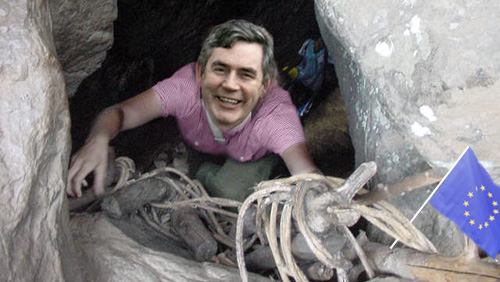
What a change. Gordon Brown, the politician known for seldom showing face at ECOFIN in Brussels when Chancellor (and for reading his papers rather that listening when he did), is now suddenly taking the EU seriously. No more lecturing other European capitals that the UK has the only financial system that works.
Brown was invited along to a meeting of Eurogroup heads of state and government in Paris on Sunday, and today prior to the European Council in Brussels he’s sounding upbeat about how the EU can play a role solving the financial crisis in a joint press conference with Barroso. Compare this with the front pages of FAZ.net and Spiegel.de and there’s not a word there about what (if anything) Merkel is trying to achieve at today’s meetings in Brussels.
It’s a case of better late than never from Brown; the financial crisis seems to have focussed his mind. While other EU states have not been immune to the problems, no banking system in Europe has been hit to the same extent as the UK. The UK government’s bailout plan has been widely appreciated (even by Paul Krugman) and Brown and Alistair Darling have however realised that action in the UK alone is not enough – hence efforts to persuade Washington and other EU Member States to take the same approach. The UK needs the EU to help dig itself out of a hole it has largely dug for itself over the last 20 years. Having said that the reaction within the EU has been largely positive, with only the Czech Republic’s Prime Minister Miroslav Topolanek stating his concerns.
Which brings us neatly on to the Conservatives in the UK whose only allies in the EU are Topolanek’s ODS party. What would David Cameron be doing in the current situation? Would he be the voice of caution too? With even the Bush administration announcing state bail outs of banks, and the UK’s predicament traceable to Thatcher’s policies in the 1980s, it’s hard for the Conservatives to develop a narrative on all of this. Thankfully Brown has been willing to swallow his pride, the UK is thinking multilaterally, and we will all be better off for that.
[UPDATE]
Benedict Brogan points out some rather unhelpful comments from Jean Claude Juncker being critical of Gordon Brown, claiming the British PM had to beg to attend the Eurogroup heads of state and government meeting. Well quite frankly Juncker there was nothing brewing in the Eurogroup until Brown kicked up a fuss – there’s no point sounding smug after the event. As for the idea Britain might consider joining the Euro – bring it on! I’m not holding my breath though.
[UPDATE 2]
In light of a comment from Jo I looked further into the quote in the Brogan entry – specifically this: “The British prime minister had to beg to be let into the room in which the euro group was meeting”. The original text in German in Rheinischer Merkur is here, and this is the specific paragraph, with the line in red being the one cited by Brogan:
RM: Im Moment erleben wir ein Europa der zwei Geschwindigkeiten. Rennt die Euro-Gruppe den anderen EU-Staaten davon?
Juncker: Die Euro-Gruppe hat Gas gegeben, weil sie Gas geben musste. Die anderen Staaten der EU haben Mühe, im selben Tempo zu reagieren. Das wird in einigen Ländern eine Debatte über die Einführung des Euro auslösen. Der britische Premierminister musste sich händeringend Zugang zu dem Raum verschaffen, in dem die Euro-Gruppe tagte. Und sofort nach seinem Vortrag musste er den Raum wieder verlassen. Das wird auf Dauer in Großbritannien den Eindruck vermitteln, dass es zielführender ist, im Euro-Raum zu sitzen, als an die Euro-Tür klopfen zu müssen. Von britischer Seite wird zwar der Eindruck geschürt, man hätte bei der Lösung in der Führungskabine gesessen. In Wirklichkeit hat man sich Zugang zum europäischen Maschinenraum erbettelt.
The translation is not quite to beg. It’s more that he was wringing his hands in order to get into the room where the Euro-Group was meeting. Juncker then smugly goes on to state that the British had only just managed to gain entry into the European machine room.
So, in short, while the translation cited is a bit wide of the mark, Juncker’s comments absolutely ooze smugness and – quite frankly – he’s wrong. The Euro-Group did not have a coherent answer to this crisis, and thanks in part to Brown, they now have a partial answer. There’s nothing I’ve seen to indicate that Britain is being towed along by the Euro-Group in any way in all of this.








Nice to see the euro issue being aired just at the point that none of the main UK political parties are actively pushing it.
PS did you read the German original article? http://www.merkur.de/2008_42__Die_Politik_hat.30660.0.html?&no_cache=1
My German stops at “Wo ist die bahnhof?” level, but Google translation of the page says the PM desperately needed to be there, which is true given the global nature of the crisis and the UK’s posiiton in the world, not that he begged. I don’t know if that matters, or if Bloomberg is more accurate than Mr Google. You might, on both.
well yes, and it can only be a good thing that we’re actually using the EU to help solve problems these days.
But phase 1 was still in the familiar mould of solve-the-problem-ourselves-implement-it-then-sell-it-to-everyone-else-so-they-do-the-same. So it’s one step at a time.
May be we can hope that the reality of being in power and the options available for making change that actually work given the realities of political global interconnectedness in the 21st century become obvious whoever is in power, eventually?